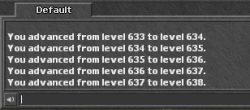Greetings OTLanders can someone explain in math this formula and how it works?
And how to edit it to reach the maximum level to 1300 for example because the level stuck at 638 with 12,999,891 exprience


Thanks in advance!
C++:
static uint64_t getExpForLevel(int32_t level)
{
int64_t x = level;
return ((50*x/3 - 100)*x + 850/3)*x - 200;
}

Thanks in advance!
